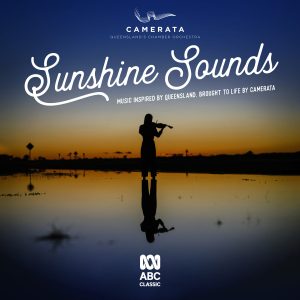Home » Album release: Sunshine Sounds » About the music » Elegy From A Short Hour Unseen
Robert Davidson’s Elegy has been a central part of Camerata’s repertoire, particularly for many regional tours of Queensland where we have been asked again and again for a recording.
Robert writes: Elegy was commissioned and first performed in 2000 by the Australian Youth Orchestra as part of a suite, A Short Hour Unseen. It is an attractive and popular work that has been used in film and theatre, with soaring overlapping melodies and an obsessive, ruminating triadic figure creating a sense of sweet melancholy.
Robert Davidson on A Short Hour Unseen (2000)

Learn more about A Short Hour Unseen and Robert's creative process and challenges.
- What inspired you to compose your piece specifically on?
I was reflecting on the loss of my mother to cancer (twelve years before I composed Elegy in 2000). It was simply that I was thinking fondly of my mother and how much I missed her when I sat down at the piano and immediately played the opening chords of the piece, singing the violin melody. The music is certainly sad, but also becomes tender and affectionate. Of course every time I hear the piece, I miss my mother.
- How would you describe your creative process?
I work very intuitively. Most days I spend time improvising (using piano, voice, double bass, guitar or just tapping out rhythms on my legs), and musical ideas present themselves (often in response to a specific emotional state or stimulus); alternatively, they come to me while I’m walking, cycling or (inconveniently) driving (don’t worry – I pull over before writing them down!). Many ideas seem to come while I’m waiting – waiting backstage before starting a concert, to teach my next class, for a meeting, for a rehearsal to start.
I also spend daily time going through backlogs of ideas, searching for what I might be able to spin out into something bigger, or put together with other ideas. I make a clean separation between these two aspects – creating ideas and selecting ideas. In the creating stage, it’s crucial that I leave out any judgement. But judgement is totally necessary for the second stage. Then it’s a different mindset again to develop the ideas and finally to put them all together into a satisfying structure, usually involving the painful process of cutting things out (I can always save them for another piece though).
- What would you consider the most challenging aspect of creating your piece?
It wasn’t a big effort for me to compose Elegy – it was one of those pieces that almost present themselves fully formed. I had to work a little bit to make the contrapuntal lines all interweave and be distinct from one another. And of course I had to work through intense emotions of grief. Music itself is a great help with that process. It’s really why I became a musician.
- What would you like your listeners to take away from your piece?
If you’re missing someone, it can be very healing to fully enter into that emotion, but not sink down into an ocean of it and drown. Music can help create a more contained emotional world, where one can sense all the space in the world to experience a large range of feelings without becoming overwhelmed.
Otherwise, perhaps listeners may simply enjoy the interweaving of melodies in a kind of tapestry of string sound.
